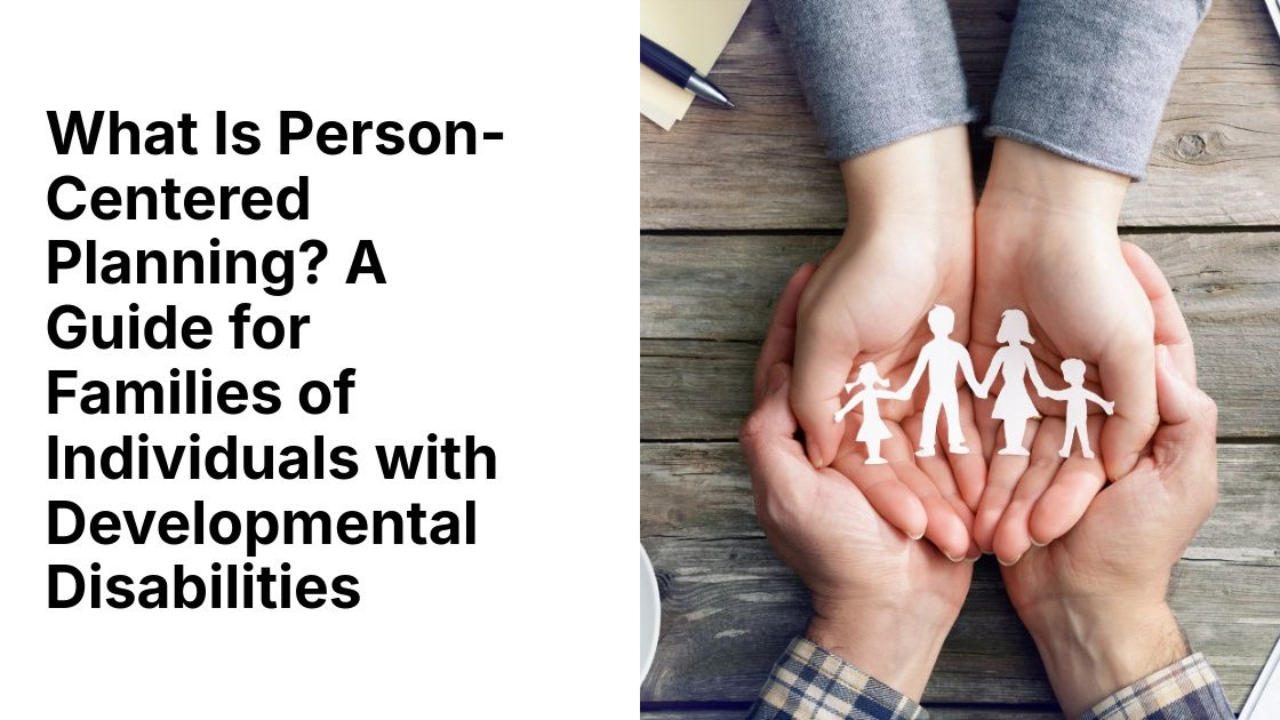What Is Person-Centered Planning? A Guide for Families of Individuals with Developmental Disabilities

When you love someone with a developmental disability, you want the very best for them—opportunities to grow, to connect with others, and to live a life that’s truly meaningful to them. But navigating services, systems, and support options can often feel overwhelming. That’s where Person-Centered Planning (PCP) comes in.
At its core, Person-Centered Planning is a way to support individuals with disabilities in making their own choices, setting their own goals, and building a life they truly want—not just one that fits within a system or someone else’s expectations.
So.... What Is Person-Centered Planning?
Person-Centered Planning is a individualized process that helps people with disabilities—identify what matters most to them. It’s about listening deeply to the person, understanding their hopes and dreams, and then working with them (not just for them) to build a roadmap for the future.
Unlike traditional planning that often focuses on services or deficits, PCP begins with the whole person—their gifts, interests, culture, voice, and vision.
Why It Matters for Families
Families are often the strongest advocates and biggest supporters in a person’s life. But it can be hard to step back and make room for someone else’s voice—especially if you've had to fight for every resource or decision along the way.
Person-Centered Planning invites families to partner in a new way—one that centers the person’s voice, promotes independence, and strengthens their ability to lead their own life with support.
It helps answer questions like:
-
What does my loved one want for their future?
-
What brings them joy, purpose, or a sense of belonging?
-
What supports do they need to thrive at home, in school, at work, or in the community?
-
Who are the people who care about them and can be part of their support circle?
Key Elements of Person-Centered Planning
-
It’s Led by the Person
Whether someone uses words, gestures, technology, or behavior to communicate—they are the focus, and their choices guide the plan. -
It’s Built on Strengths
PCP focuses on what a person can do and what they want to do—not just what services they need. -
It Includes the People Who Matter Most
Friends, family, mentors, and supporters are invited to be part of the planning process, creating a circle of support around the individual. -
It’s Ongoing and Flexible
People change, and plans should too. Person-Centered Planning is not a one-time event—it’s a process that evolves as a person’s life, dreams, and needs change. -
It Honors Culture and Identity
A good plan reflects who the person is in every way—including their language, values, traditions, and how they see themselves in the world.
How Person-Centered Planning Helps
-
Increases self-confidence and self-advocacy
-
Clarifies goals and next steps for education, work, relationships, or independent living
-
Improves communication among families, service providers, and support teams
-
Creates more personalized supports that actually make sense for the person’s life
Getting Started
If you're new to Person-Centered Planning, here are a few first steps:
-
Start with conversations: What does your loved one enjoy? What dreams do they have? What do they want more (or less) of in their life?
-
Explore planning tools or facilitators: Many communities have trained facilitators who can guide the process.
-
Remember, it’s a journey: You don’t have to have it all figured out. The important part is that your loved one’s voice is heard, valued, and guiding the way.
Person-Centered Planning is about more than just services—it’s about honoring someone’s right to choose, grow, and be seen as a whole person. For families, it offers a powerful shift: from doing things for someone, to walking with them as they shape a life that reflects their unique gifts and dreams.
Want to learn more about how Person-Centered Planning could work for your family?
Let’s connect! You can book a free call to explore your options, ask questions, and discover what supports might be the right fit. Whether you’re just getting started or looking to refresh an existing plan, I’d love to help you take the next step.
A free 30-minute call to help you explore next steps, get advocacy support, and start building a plan that works for your family.
Your journey is important—and you don’t have to walk it alone.
Book a Free Advocacy & Planning Call
If you’re curious about how we can help your loved one, let’s talk! In this free 30-minute call, we’ll:
💬 Talk about your loved one’s passions and strengths
💬 Explore possible ideas
💬 Identify first steps to turning a dream into reality

